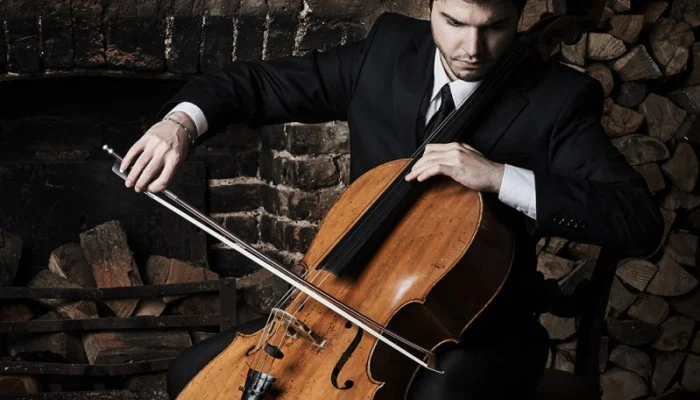
One of the most distinguished cellists of his generation is this year’s special guest at the 40th Fajr International Music Festival. This acclaimed musician, whose performances have been widely embraced worldwide, has quickly earned a prominent place in classical music with his brilliant technique and rich sound. In honor of his participation in the 40th Fajr International Music Festival, we had an interview with him that you can read below:
Your presence at the 40th Fajr International Music Festival is a significant event. What does this opportunity mean to you? Have you been familiar with Iranian music or Iranian musicians before?
All the festivals I’ve participated in have been very valuable to me. Additionally, being a part of the 40th Fajr International Music Festival is a great honor. This opportunity allows me to share my musical journey with a diverse audience and immerse myself in Iran’s rich cultural heritage. Although I haven’t directly collaborated with Iranian musicians, I’ve always had great admiration and respect for Iranian music and its intricate melodies.
What pieces have you chosen for your performance at the festival, and what factors influenced your selection?
At the 40th Fajr International Music Festival, along with pianist Eche Daghestan, we will present a special program that connects the music of various cultures. This program will include a wide range of works, from the classical arrangements of Zulfi Liyavonli’s songs to Astor Piazzolla’s Libertango, Fahir Atakoğlu’s Sultan, and Snowstorm Romance by Georgi Sviridov. Each piece has been specifically arranged for cello and piano to provide a unique experience for the audience.
Have you collaborated with Iranian musicians before, or performed in Iran? Do you have any plans for such collaborations in the future?
I haven’t yet collaborated with Iranian artists, and this will be my first concert in Iran, so I’m very excited about this experience. Iranian music and culture have always fascinated me. The only issue is that my current schedule is quite demanding, which makes it difficult to coordinate such collaborations. However, I definitely have this in mind and I look forward to exploring collaboration opportunities in the future and meeting the talented artists participating in this festival.
You have performed worldwide, from Europe and North America to Asia and the Far East. Which concert or country has been the most special experience for you?
Choosing just one concert or location is very difficult because each performance is unique. Each audience, venue, and culture adds something distinct to the experience, and that’s what makes musical tours so amazing. However, performing in Turkey has been particularly special for me. This country holds deep personal and cultural roots for me. Performing where I feel such a strong connection to the music and people is an incredibly valuable experience.
In BBC Proms 2017, you performed a piece by John Williams with the BBC Concert Orchestra. How did this performance impact your career?
My performance at the Proms was a major milestone. It’s a global event that allowed more people to discover my work. This experience also showed me how important it is for a musician to be able to perform both classical and modern works with the same passion and enthusiasm. This concert opened new doors for me and inspired me to explore different kinds of music.
In 2021, Classic FM named you one of the “30 Young Bright Classical Musicians Today.” How did this title affect your professional path?
Being named one of the “30 Young Bright Classical Musicians” was an exciting experience. While this title didn’t change my career path, it opened new opportunities and allowed more people to get to know my work. It helped me establish valuable connections with musicians, orchestras, and audiences from all over the world.
You’ve had extensive collaborations with Fazıl Say, and even released the album The Tree of Life with him. What inspires you about collaborating with him?
Collaborating with Fazıl Say has been an incredible experience. His music is a unique blend of classical and Turkish styles, which makes performing it very exciting.
Your performance of Fazıl Say’s Şahmeran Concerto for Cello has garnered a lot of attention. What makes this piece special, and what challenges did it present during your performance?
The Şahmeran Concerto is deeply profound both musically and emotionally. The combination of Turkish music with Western musical structures, and the wide range required from the cello, makes it a unique work.
How was your experience recording Şahmeran with the Deutsche Symphony Orchestra in Berlin? Did recording this piece differ from performing it live?
Recording this piece in the studio allowed us to focus on precise details and deliver a flawless performance. However, live performances are different because the energy and connection with the audience make them special.
You’ve collaborated with prestigious orchestras like the Philharmonia Orchestra, the Russian National Orchestra, and the BBC Scottish Symphony Orchestra. Which of these experiences has been the most memorable for you?
All of these collaborations have been valuable, but my performance with the BBC Scottish Symphony Orchestra at the St. Magnus Festival was a special experience. The intimate atmosphere of the festival and the outstanding capabilities of the orchestra made it an unforgettable moment.
Do you have any plans to blend classical music with Turkish or Iranian traditional music?
I’ve previously released the album Illusion, where I performed some popular classical pieces fused with Eastern instruments. I have a deep love for Iranian music, and I will likely have opportunities for such collaborations in the future.
Your cello, made by Giuseppe Guarneri Filius Andrea (1700), has some unique characteristics. How does it influence your playing style?
This cello, one of the few remaining top instruments in the world, has a deep and rich sound that allows me to express emotions in a clear and warm manner.
Do you have any new projects or albums in the works?
In the future, I will share updates about my collaborations with various artists and for the first time, I will be releasing pieces I’ve worked on for a long time on digital platforms.
What advice would you give to young cellists who are aiming for an international career?
If they truly love music, they should never give up. I’ve faced many challenges, but the most important thing is to do what you love. No one should force us to choose a path that doesn’t resonate with our spirit and interests.
Interview By Farid Parish
